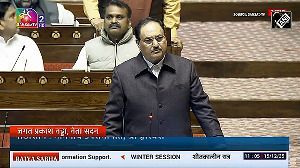Indeed, many more than half of the political class in our Lok Sabha is now opposed to the 123 pact.
Outside Parliament, at least three reputed nuclear scientists have been critical all along of the nuclear deal. Further, two acknowledged strategic experts, Brahma Chellaney and Bharat Karnad, with weighty books to their credit, have been relentlessly ruthless in their writings over the last two years in The Asian Age, the only major English language newspaper that has allowed them to express their views freely and frankly without concern for the government's patronage. None of the gentlemen in this group can be accused of harbouring any sort of political agenda.
Yet, the Congress Party has labeled the 123 Agreement as 'historic' and congratulated their PM for shepherding it. The Doctor Sa'ab has not only blushed at this praise but has apparently now come to believe that he is a man of destiny who alone knows what exactly it is that is in the national interest -- 'enlightened national interest' to use the novel phrase he coined with his penchant for 'out of the box' thinking. He has apparently started believing that he can simply do no wrong by India. Any criticism now makes him emotional and agitated, regarding it as an assault on his integrity.
But a billion dollar question arises. Instead of making sanitised statements in praise of his nuclear deal mixed with assurances of cookies to come and pleas for putting trust in him, why has he never given a point-by-point rebuttal of the criticism levied by the kind of worthies mentioned above? Why has he relied instead on his bureaucrats and petjournalists to attempt that in vain?
With his government's future now in peril, Doctor Sa'ab must really attain the 'historic' by being the first Indian prime minister to author a public document refuting each and every criticism made so far against his biggest policy yet.
Let him sulk no more at criticism. Let him instead pick up his pen and start by shooting down just six points of Brahma Chellaney's long critique splashed on the front page and beyond of The Asian Age of August 4, 2007.
Below are the six of Chellaney's several contentions:
1. The 123 Agreement confers on the US an unfettered right to terminate cooperation with India at will. Even though the termination of the pact is to take effect at the end of a one-year notice, the agreement explicitly empowers the US to forthwith suspend all cooperation without much ado. And termination does not enjoin it to make alternate arrangements for supplies before it ceases cooperation.
2. In a departure from a standard clause in America's other 123 Agreements, this accord with India violates a core principle of international law wherein the failure to perform a treaty cannot be justified by invoking a domestic law. Instead, America's latest pact with India is unambiguously anchored in the supremacy of national laws and regulations -- meaning laws like the Hyde Act of the US because there is no Indian law governing nuclear cooperation with the US or any other country. This feature is in contrast with the 1985 US-China 123 Agreement which recognises that principle of international law and prohibits invoking an internal law as justification for its failure to perform a treaty. By also allowing, in the event of termination, the US to demand the return of all equipment and fuel supplies in the past, it is at liberty to terminate cooperation retroactively.
3. While Section 106 of the Hyde Act openly bans Indian testing, and the agreement upholds reinforces that test ban by upholding the applicability of domestic laws, Washington has already recommended that the Nuclear Suppliers Group (NSG) link its proposed exemption for India to a similar test ban. In other words, the test ban under the 123 Accord is to be converted into a multilateral legality through the NSG.
4. The US has the right to terminate cooperation at will and withdraw from all its obligations, but India has been denied that right to withdraw from its obligations even if the agreement is terminated at the insistence of the US. The agreement more than once states the permanent nature of India's obligation to accept inspection of its entire civil nuclear programme, including the indigenously built facilities which it is voluntarily opening to external scrutiny.
5. The text of the agreement clearly shows that US has granted India the right to reprocess only in principle. It will happen only after India builds the new facility (expected to take at least five years) after which 'the parties will agree on arrangements and procedures for reprocessing 'in this new facility." This reprocessing agreement would be vetted by the US Congress.
6. Transfer of 'dual use' equipment and technology is not guaranteed as envisaged but is subject to amendment of the present Agreement, with the Hyde Act itself prohibiting transfer to certain areas. Moreover, India has accepted that any enrichment, reprocessing or heavy water activity, even when under stringent IAEA inspections, constitute 'dual use' and thus liable to be restricted. In addition to IAEA inspections, the US has staked in its end-use monitoring as called for in the Hyde Act if the IAEA decides that the application of its safeguards is no longer possible.
Does Doctor Sa'ab have the conviction to refute the above in black and white? Or will he sulk at the challenge and merely ask us to trust his integrity and vision of 'enlightened national interest?'





